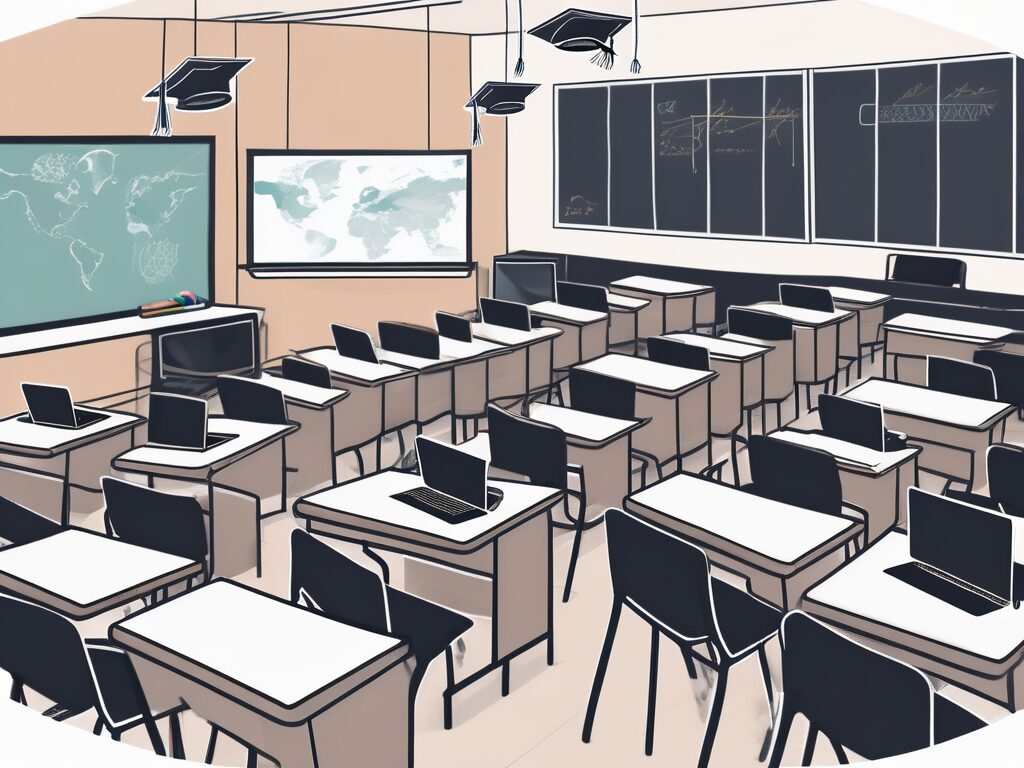In the modern era, technology has become a cornerstone of education, transforming traditional classrooms into dynamic learning environments. This is particularly evident in Malaysia, where educators armed with a Master’s in Education are leveraging technology to enhance teaching and learning experiences. This article will delve into four innovative methods being employed in Malaysian classrooms, showcasing the power of technology in education.
1. Interactive Whiteboards
Interactive whiteboards have revolutionised the way lessons are delivered in classrooms. These high-tech boards, which can be likened to a computer screen the size of a traditional chalkboard, allow teachers to present information in a more engaging and interactive manner.
With a Master’s in Education, teachers can fully utilise the capabilities of these whiteboards. They can incorporate multimedia elements such as videos, images, and audio clips into their lessons, making the learning experience more immersive for students. It’s akin to upgrading from a black-and-white television to a high-definition colour one; the difference in engagement and understanding is palpable.
Benefits of Interactive Whiteboards
Interactive whiteboards offer numerous benefits. They facilitate better visual learning, as complex concepts can be illustrated and manipulated in real-time. This is particularly beneficial for visual learners who grasp information better when it’s presented in a graphical or pictorial format.
Moreover, these whiteboards encourage active participation from students. With features that allow students to interact directly with the board, lessons become more engaging and interactive. It’s a far cry from the passive note-taking that characterised traditional teaching methods.
2. Learning Management Systems
Learning Management Systems (LMS) are another technological innovation making waves in Malaysian classrooms. These platforms provide a virtual learning environment where teachers can manage course content, and students can access learning materials at their convenience.
For educators with a Master’s in Education, an LMS is a powerful tool. It allows them to track student progress, administer assessments, and provide personalised feedback. It’s like having a personal assistant that helps manage the administrative aspects of teaching, freeing up time for educators to focus on what they do best – teaching.
Advantages of Learning Management Systems
An LMS offers several advantages. It provides flexibility for students, who can access course materials anytime, anywhere. This is particularly beneficial in a country like Malaysia, where geographical constraints can pose challenges to education.
Furthermore, an LMS allows for personalised learning. Teachers can tailor content to suit individual student needs, making learning more effective. It’s like having a custom-made suit as opposed to a one-size-fits-all garment; the fit is just better.
3. Mobile Learning
Mobile learning, or m-learning, is a method of learning that utilises mobile devices like smartphones and tablets. In Malaysia, where mobile penetration is high, this method is particularly effective.
Teachers with a Master’s in Education can leverage mobile learning to deliver content in a manner that resonates with today’s digital natives. From educational apps to e-books, mobile devices offer a plethora of resources that can enhance learning. It’s like having a library and a classroom all in one’s pocket.
Perks of Mobile Learning
Mobile learning offers several perks. It provides learning on-the-go, allowing students to utilise their commute time effectively. Moreover, it caters to the digital habits of today’s students, making learning more appealing.
Additionally, mobile learning promotes self-paced learning. Students can learn at their own pace, revisiting concepts as needed. This personalised approach can lead to better understanding and retention of knowledge.
4. Gamification
Gamification, the application of game-design elements in non-game contexts, is being increasingly used in education. In Malaysian classrooms, teachers with a Master’s in Education are using gamification to make learning fun and engaging.
From educational video games to reward systems, gamification can transform mundane lessons into exciting challenges. It’s like turning the classroom into a playground, where learning becomes a fun-filled activity rather than a chore.
Benefits of Gamification
Gamification offers numerous benefits. It increases student engagement, as the competitive nature of games motivates students to perform better. Moreover, it promotes active learning, as students learn by doing rather than by passive listening.
Furthermore, gamification can enhance social learning. Games often require collaboration and communication, fostering teamwork and social skills among students.
In conclusion, technology is reshaping education in Malaysia, with educators leveraging various methods to enhance teaching and learning experiences. From interactive whiteboards to gamification, these methods are making classrooms more dynamic and learning more engaging. As technology continues to evolve, it’s exciting to imagine what the future holds for education in Malaysia.
Advance Your Teaching Career with The IQTS at UWE
As technology revolutionizes education in Malaysia, take the next step in your professional journey with The International Qualified Teacher Status (iQTS) Programme at UWE. Embrace the opportunity to meet stringent international qualification requirements, boost your career progression, and connect with a global community of educators. With the iQTS, you’ll gain invaluable insights into international curricula, making you 65% more adaptable in diverse educational settings. Don’t let the challenges of career advancement hold you back. Join a network of professionals who have seen a 45% increase in promotion rates and a 30% salary boost. Make Your Next Step towards a transformative educational career with the iQTS programme, designed for educators like you who are committed to excellence and innovation in the classroom.

